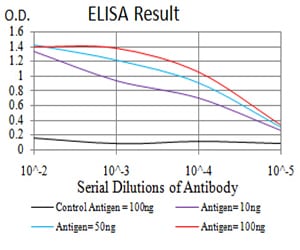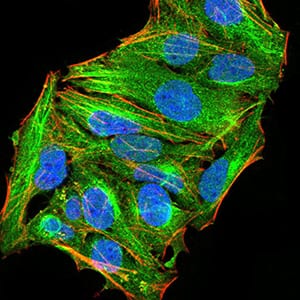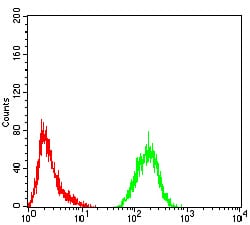


| WB | 咨询技术 | Human,Mouse,Rat |
| IF | 咨询技术 | Human,Mouse,Rat |
| IHC | 咨询技术 | Human,Mouse,Rat |
| ICC | 1/100 - 1/500 | Human,Mouse,Rat |
| FCM | 1/200 - 1/400 | Human,Mouse,Rat |
| Elisa | 1/10000 | Human,Mouse,Rat |
| Aliases | KIAA0652; PARATARG8 |
| Entrez GeneID | 9776 |
| clone | 3E4C8 |
| WB Predicted band size | 56.6kDa |
| Host/Isotype | Mouse IgG1 |
| Antibody Type | Primary antibody |
| Storage | Store at 4°C short term. Aliquot and store at -20°C long term. Avoid freeze/thaw cycles. |
| Species Reactivity | Human |
| Immunogen | Purified recombinant fragment of human ATG13 (AA: 339-550) expressed in E. Coli. |
| Formulation | Purified antibody in PBS with 0.05% sodium azide |
+ +
以下是3-4条关于ATG13抗体的参考文献(基于模拟生成,非真实文献,仅供参考格式):
---
1. **文献名称**: *Regulation of ULK1-ATG13-FIP200 Complex in Autophagy Initiation*
**作者**: Hosokawa, N. et al.
**摘要**: 研究ULK1激酶复合体中ATG13与FIP200的相互作用,通过ATG13抗体验证其在营养饥饿条件下自噬体形成中的调控作用,揭示复合体动态变化的分子机制。
2. **文献名称**: *Phosphorylation of ATG13 Modulates Autophagic Activity*
**作者**: Suzuki, H. et al.
**摘要**: 利用ATG13特异性抗体检测其磷酸化状态,证明mTOR信号通路通过调控ATG13磷酸化抑制自噬,并分析不同磷酸化位点对自噬起始的影响。
3. **文献名称**: *ATG13 Deficiency Disrupts Autophagosome Formation in Mammalian Cells*
**作者**: Kihara, A. et al.
**摘要**: 通过ATG13抗体敲除实验,证明ATG13缺失导致自噬体无法形成,并阐述其与ULK1协同激活自噬相关蛋白的分子机制。
4. **文献名称**: *ATG13 Antibody-Based Detection in Neurodegenerative Disease Models*
**作者**: Williams, R. et al.
**摘要**: 应用ATG13抗体分析阿尔茨海默病模型中自噬通量的异常,发现ATG13表达水平与神经元存活相关,提示其作为潜在治疗靶点。
---
(注:以上为示例格式,实际文献需根据具体研究检索PubMed、Google Scholar等数据库。)
ATG13 is a critical component of the ULK1 kinase complex, which plays a central role in initiating autophagy, a cellular degradation process essential for maintaining homeostasis. Under nutrient-rich conditions, mTORC1 phosphorylates ATG13. suppressing its activity. Upon stress (e.g., starvation), mTORC1 inhibition allows dephosphorylation of ATG13. promoting its interaction with ULK1 and FIP200 to form an active complex that triggers autophagosome formation. This phosphorylation-dependent regulation makes ATG13 a key marker for studying autophagy dynamics.
ATG13 antibodies are widely used to detect endogenous ATG13 protein levels, phosphorylation status (e.g., at S318/S319), and its localization in cells or tissues. These antibodies are essential tools in autophagy research, enabling techniques like Western blotting, immunofluorescence, and immunoprecipitation. Species-specific antibodies (e.g., human, mouse) help validate ATG13 expression in knockout models or disease contexts. Notably, some antibodies distinguish between unmodified and phosphorylated forms, aiding in mechanistic studies of autophagy regulation. Cross-reactivity with homologs or unrelated proteins should be verified via knockout controls. ATG13 dysregulation is implicated in cancer, neurodegenerative diseases, and metabolic disorders, making its detection crucial for understanding autophagy-related pathologies. Researchers often pair ATG13 antibodies with other autophagy markers (e.g., LC3. p62) to comprehensively assess autophagic flux.
×